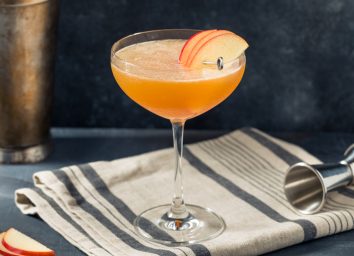
Beverages may seem like a minor part of your meal or just something you grab for a refreshing, hydrating, and caffeine-filled pick-me-up. However, what you choose to drink—or not drink—as well as how much and how often you consume certain beverages, can seriously impact your health in a range of ways that you need to know about. In fact, there are some drinking habits that can lead to weight gain.
For instance, a 2021 study that was published in Nutrients found that drinking an increased amount of unhealthy drinks or opting for problematic beverages such as sugar-sweetened beverages (SSBs) and artificially-sweetened beverages (ASBs) over the long term can lead to a higher risk of type 2 diabetes (T2D), cardiovascular diseases (CVDs), and all-cause mortality. Beyond that, additional studies have linked drinking a fair share of sugary beverages with kidney disease, non-alcoholic liver disease, gout, and oral health issues, as well as obesity and weight gain, according to the CDC.
This may be a cause for concern for you or someone in your life due to the fact that the National Health and Nutrition Examination Survey noted around 50% of American adults drink at least one sugary beverage each day. Those drinks tend to be an average of 113 kilocalories (kcal) for women, which makes up over 6% of the daily calories they should aim to consume. For men, the numbers are even higher with 179 kilocalories, which is nearly 7% of their ideal daily intake.
To give you a little more perspective, a 12-ounce serving of a sports drink usually has around 5 teaspoons of sugar and 97 calories, while brewed sweet tea has 9 teaspoons of sugar and 115 calories, per the USDA Food Data Central. Fruit drinks may seem like a healthier option, yet they can have around 10 teaspoons of sugar and 186 calories, while different kinds of soda can have 10 to 13 teaspoons of sugar and 155 to 195 calories.
Frankly, there are a few drinking habits that might be resulting in consuming more calories and sugar than you realized. In turn, they could be making you gain weight. That's why we've talked to three dietitians who filled us in on what you need to know about drinking habits leading to weight gain.
Drinking sweetened tea

Some tea can calm nausea, lower your risk of diabetes, and even help you live longer. On the other hand, sweet tea or hot tea with a ton of sugar may do more harm than good.
"Drinking sweetened drinks like sugar-added tea can lead to weight gain because the drink is high-calorie, but doesn't make you feel full or satiated, yet, it's also tasty" says Johna Burdeos, RD, "and as a result, it's possible to drink too much in a sitting or throughout the day."
"Sugar-sweetened beverages like sweet tea pack on the calories quickly," says Nicole Chenard, MS, RD, LDN. "For example, a 20-ounce bottle of Lipton Green Tea Citrus contains 120 calories and 29 grams of added sugars."
"Sweetened tea has added sugar, which contributes to excess calories," says Catherine Gervacio, RD, and nutrition writer for Living.Fit. "Sugar causes a fast rise in blood sugar, leading to the release of cortisol and adrenaline to manage the body's stress response. Also, chronic consumption of excess sugar may result in resistance to leptin, a hormone that regulates fat storage and appetite."
Choosing sugary, flavored coffee

The next time you stop by Starbucks, you may want to order a relatively low-calorie beverage as opposed to ones that dietitians consider to be the worst drinks on the menu, which sometimes include sugary, flavored coffee. "Flavored coffee has the potential to cause rapid weight gain," Chenard says. Although she also notes that "one 'pump' of flavor like vanilla, mocha, caramel, or peppermint usually contains about 20 calories (of added sugar)," some syrups have even more.
"Many drinks served at popular coffee shops will add two to eight pumps of flavor, adding up to a whopping 160 calories of added sugar to start your day (which is arguably the worst time to pump that much added sugar in your system)," Chenard tells us. That's not to mention the fact that "an extra 250 calories per day is all it takes to gain half a pound a week, so in a month that would be 2 pounds."
Gervacio points out that, "Additionally, sugars are 'empty calories' which means it offers nothing else, no significant nutrients, other than calories. The caffeine in coffee also has mixed effects when it comes to weight loss. Caffeine can actually boost metabolism and aid in weight loss. On the other hand, it can disrupt a normal sleep pattern, which will affect metabolism and may result in weight gain.
"The key here is moderate intake," Gervacio explains. "The recommended amount of caffeine is less than 400 milligrams a day, which is equivalent to about 3-4 cups a day. This is already the safe amount to take for the general population. Those at risk of hypertension and/or cardiovascular disease should consult a doctor first to find out their caffeine limits."
Choosing the wrong water enhancements
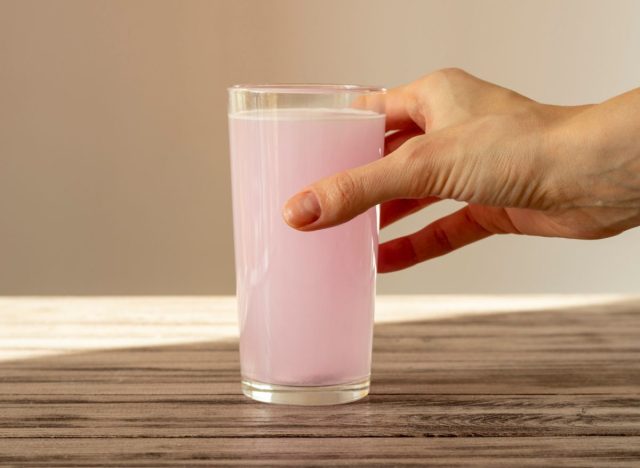
Enhanced water can give you a boost of added vitamins, minerals, and electrolytes. Although that might make them seem healthier than regular ol' water, Bonnie Liebman, director of nutrition at the Center for Science in the Public Interest, told Time that "[m]ost of the claims are marketing ploys to sell water at a higher price," but "are not about scientific evidence, and not about the public's health." Potentially even more alarming, Walter Willett, professor of epidemiology and nutrition at Harvard's School of Public Health, told The Washington Post that enhanced water products are "unequivocally harmful to health."
"Drinking enhanced water can be a gamble," Chenard tells us. "Any liquid calories, whether they're natural or not, hit us hard and fast and can be a huge energy suck, leading us to think all we need is more 'enhanced' beverages! Always read the label. They can really trick us with healthy-looking images, colors, and fonts, but that's just marketing. It doesn't mean it's healthy or helpful. I recommend checking the calories, calories per serving, added sugars, protein, fat, fiber, and the ingredients list! If there are no added sugars, but there are no-calorie sweeteners added, that's not helpful either, and can delay your weight loss/health journey even further!"
"As long as enhanced water has no calories, it will not significantly contribute to weight gain," Gervacio says. "On the other hand, added sugar may be the downside of taking this beverage. [Additionally,] excess consumption can cause side effects, especially in disrupting the electrolyte balance in the body. Symptoms include headaches, nausea, vomiting, and muscle cramps. Imbalanced levels of electrolytes also contribute to water weight."
Drinking sports drinks
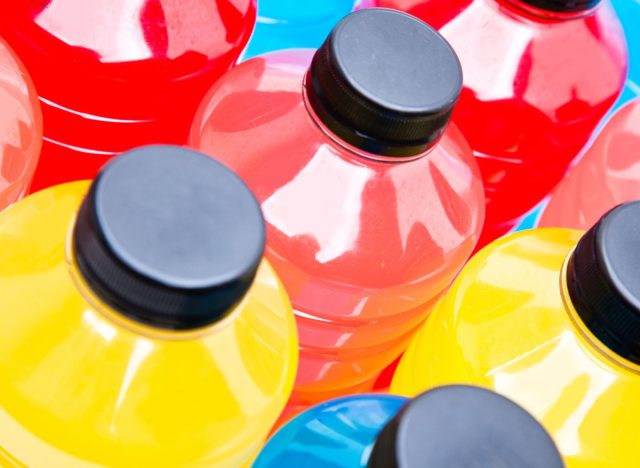
Sports drinks are another beverage that seems like a healthy option. However, they're also something that you may want to leave on the store shelf if you're not an athlete or are not taking on serious physical activity.
"The original sports drinks serve a specific purpose," says Chenard says, which is "to replenish electrolytes lost in sweat before, during, and after athletic activity (ex: playing football outside in Florida). Drinking sports drinks while playing video games in your basement or when you don't need them probably won't help your health. We do need some sugar to help get the electrolytes into the cells so we can properly hydrate, so 'sugar-free' sports drinks don't make sense for the average person or athlete."
Just consider the fact that a 12-ounce serving of cola has around 39 grams of sugar, while a sports drink usually includes no less than 21 grams, according to the Harvard T.H. Chan School of Public Health. Gervacio addresses both the sugar and electrolytes found in sports drinks, as well as another ingredient you may not have thought about, saying, "Added sugar may also contribute to calories, and an imbalance of electrolytes can add up to water weight. Some sports drinks contain caffeine, which can either boost metabolism and contribute to weight loss, or disrupt sleep and slow down metabolism, leading to weight gain."
Drinking sugary fruit juice

You may think that fruit juice are a healthy choice for weight loss, but Burdeos says "Sugary drinks can increase your appetite." She explains, "Regular Consumption of sugary foods, including drinks, can lead to spikes and crashes in blood sugar levels. The crashes are what make you feel hungry. And if you're consuming such sugary products regularly, you'll feel more of a need to eat more than you normally would if your blood sugars were more stable."
"It's better to eat fresh or frozen fruit than it is to drink fruit juice," Chenard points out. She also notes, "They are not the same. There's no fiber in fruit juice, so, sugar-wise, it's like drinking a soda. If you're watching your weight, eat the fruit, don't drink the juice."
"Fruit juices have a higher glycemic index (GI) as compared to fresh, whole fruits, so they spike up the GI faster," Gervacio says while breaking down the issue. "Aside from the one I mentioned above (drinking sweetened tea), sugars are rapidly metabolized by the body for energy production. But if the body isn't able to use all the sugar for energy, it will be stored as fat. The body commonly stores these unburned fuels as fat in the belly, also called abdominal fat."
Not getting enough protein in your smoothies
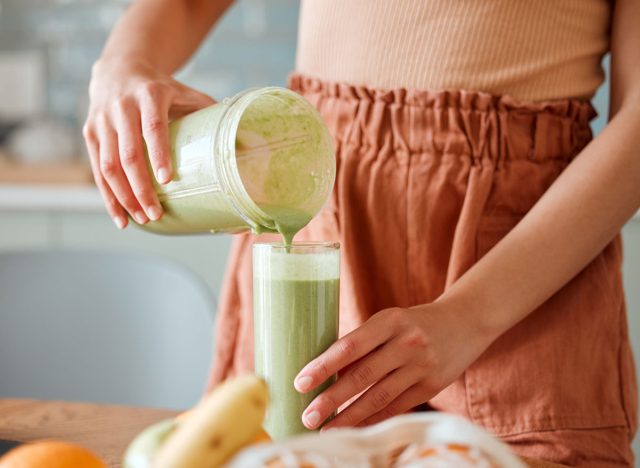
Smoothies can be fabulous for your health if you choose the right ingredients. Granted, Chenard says that "low-protein smoothies, which is most of what you'll find out there, or make at home, can be dangerous to our bodies because we end up drinking too much sugar at once, without the balance of healthy fat and protein, which our bodies can't handle/can't metabolize efficiently." She explains "This leads to an excess of sugar in the blood, which is a problem. Not enough water (plain water) is a problem, too."
"Moderate protein is necessary to build lean muscles and increase satiety while losing fat," says Gervacio. "There is actually nothing wrong with taking low-protein smoothies because protein can still be sourced from other meals. However, deficient protein consumption may lead to weight gain due to increased appetite. Also, with insufficient amino acid from protein, muscle repair and development may be affected, causing delay or poor lean muscle development."
To be sure, you may want to opt for high-protein smoothies that are both healthy and tasty.
Drinking soda
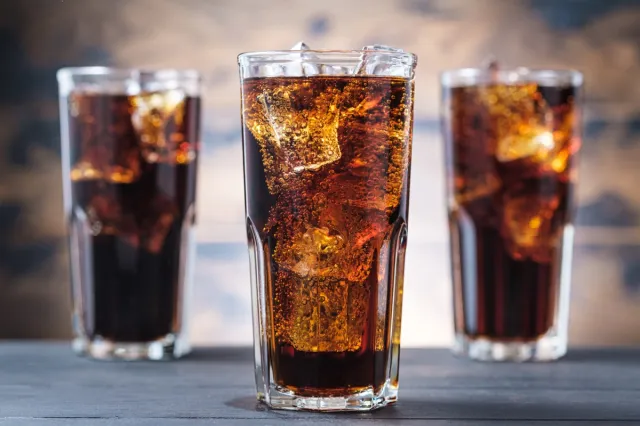
"Soda has a lot of added sugar, which not only contributes to calories, but also enhances appetite," Gervacio says. She also notes that "a 12-ounce portion contributes to about 150 calories with 37 grams of sugar—and no protein or fiber."
"Drinking sugary drinks regularly can lead to insulin resistance," Burdeos tells us. "This is a condition in which the body becomes less effective at using insulin to regulate blood sugars. When this happens, the body may start to store more fat, thereby causing weight gain."
That's on top of the fact that "Sugary drinks contain a high amount of fructose." Burdeos explains that "Fructose is a type of sugar primarily metabolized in the liver as opposed to getting directly absorbed into the bloodstream like glucose. High fructose consumption can lead to fat accumulation around the liver and belly."
Regularly consuming too much alcohol
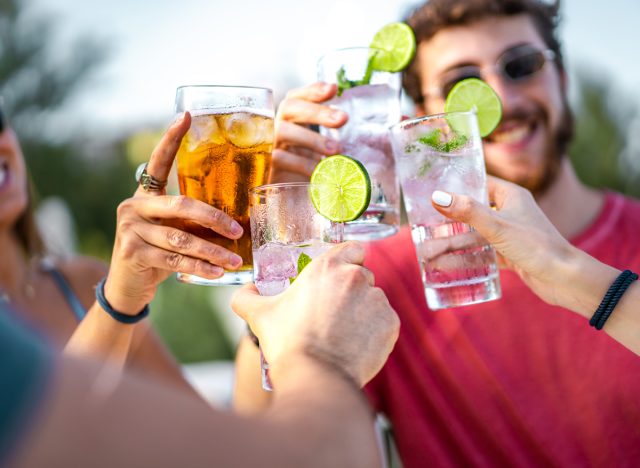
"Like the other drinks mentioned, alcohol can pack calories," says Burdeos. Beyond that, she adds that "Drinking alcohol regularly can make you feel sluggish and less likely to engage in physical activity," can "disrupt the metabolism," and "interfere with sleep," while noting that "a lack of sleep or poor sleep quality is linked to weight gain." She also notes, "Alcohol lowers inhibitions. You may not exercise good judgment in what and how much you eat when you've had too much to drink."
Chenard also explains that alcohol "stresses out the entire system, and the alcohol gets metabolized first because it's a toxin, so you're making it extremely difficult for your body to function, let alone begin to think of losing weight. Alcohol is 7 calories per gram, so it adds up more quickly like fat and is almost twice as calorically dense as carbohydrates and protein."
On the other hand, Gervacio says "Drinking alcohol at the right portion is actually beneficial." She explains that "The recommended amount set by the CDC is 1-2 drinks a day in which red wine is the healthiest choice due to its antioxidant content called polyphenols and resveratrol."
"However, excessive consumption can lead to weight gain," Gervacio is sure to add. "Alcohol's caloric density is in-between carbohydrates and fat. While a gram of carbohydrates has 4 calories and a gram of fat has 9 calories, alcohol has 7 calories in every gram. This means it can highly convert to fat when not used by the body. When taken in excess, it also causes fatty liver disease, which is associated with high visceral fat."
Drinking high-calorie beer
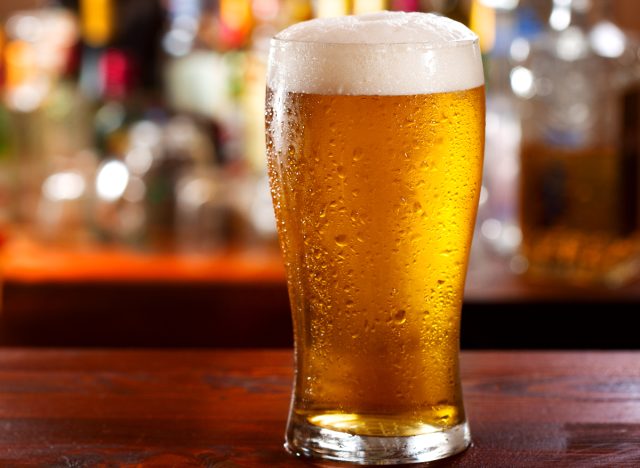
Even if you try to keep the amount of alcohol you drink within a reasonable amount, the boozy beverages may still affect your health and your weight if you're not ordering a low-calorie beer. Chenard says, "Drinking high-calorie beer—it all adds up. Always be sure to check your calorie budget! 7 calories per gram of alcohol add up very quickly!"
"As already named, high-calorie beer is dense in calories and therefore will be transformed into fat due to excess calories," Gervacio says. "A can of beer has around 150 calories with no protein and fiber. Alcohol may also cause sleep disruption, which can potentially slow down metabolism and lead to weight gain."
Enjoying sugary cocktails
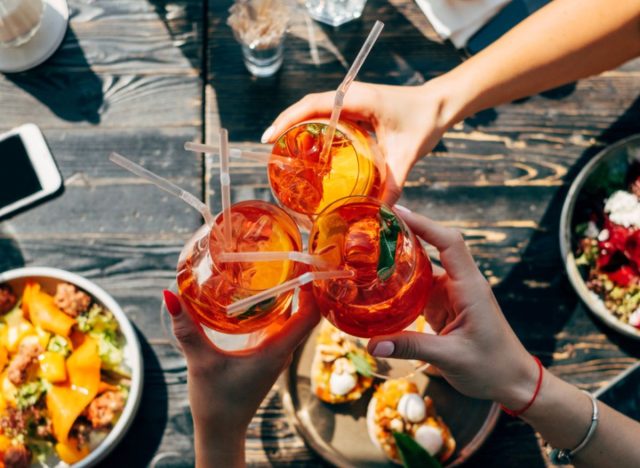
Your favorite cocktail may not be any better for you than a beer that boasts plenty of calories. Gervacio says, "Cocktails add up to calories via the added sugar. Also, they contain alcohol which, as explained above, can cause weight gain. Alcohol is also known to enhance appetite, resulting in increased food intake." This is backed up by studies that focused on the connection between alcohol and food consumption, which were published in Nature and Physiology & Behavior.
Chenard also notes that when it comes to "drinking sugary cocktails—sugar is sugar, and when mixed with alcohol, it is the perfect cocktail for weight gain." Instead, she has a few alternative suggestions, saying, "Aim for soda water and lemon or lime as mixers to add a little flavor without dipping too deep into your calorie salary!"
Not drinking enough water

"When you drink less water, in particular, you may be experiencing thirst," Burdeos says. "However, it's not uncommon to confuse thirst for hunger, so you may overeat instead of quench your thirst. Waiting until you feel thirsty to drink water is already a sign of slight dehydration. The body's thirst sensations are delayed."
On top of that, a need for water can also lead to choosing unhealthy options. Chenard tells us that "A lot of times we think, 'I'm thirsty' and reach for a sugary beverage like soda or sweet tea or fruit juice, but all we need is water, which helps to energize us, lubricate our organs, regulate our body temperature, and remove toxins from our brain and blood." It turns out that "The sugary beverages trick our brains into thinking we've quenched our thirst, but the sugar and other ingredients in them create more work for our bodies, resulting in a need for—get this—more water!"
You should also be aware of the fact that when you don't drink enough water, problems may arise. Gervacio explains that "Not drinking enough water disrupts the supposed normal electrolyte balance in the body." Additionally, "It affects how the body functions, so it may not achieve a good metabolism and may not efficiently burn fat. There's also a chance that the body would experience craving as a result of water depletion."
In fact, water is the numero uno, undefeated champion, and best choice of beverage. That's thanks to the fact that it keeps you from becoming dehydrated while also helping you avoid both kidney stones and constipation. There are also no calories in water, meaning it won't cause unnecessary and potentially unhealthy weight gain. Simply pour yourself a cup and enjoy!
- Source: https://www.ncbi.nlm.nih.gov/pmc/articles/PMC8402166/
- Source: https://pubmed.ncbi.nlm.nih.gov/20032963/
- Source: https://pubmed.ncbi.nlm.nih.gov/32830237/
- Source: https://www.cdc.gov/nutrition/data-statistics/sugar-sweetened-beverages-intake.html
- Source: https://fdc.nal.usda.gov/fdc-app.html
- Source: https://www.hsph.harvard.edu/nutritionsource/sports-drinks/
- Source: https://www.mayoclinic.org/healthy-lifestyle/nutrition-and-healthy-eating/in-depth/low-glycemic-index-diet/art-20048478
- Source: https://www.ncbi.nlm.nih.gov/pmc/articles/PMC6566799/
- Source: https://academic.oup.com/ajcn/article/87/5/1558S/4650426
- Source: https://fdc.nal.usda.gov/fdc-app.html#/food-details/174852/nutrients
- Source: https://my.clevelandclinic.org/health/diseases/22206-insulin-resistance
- Source: https://www.health.harvard.edu/blog/snooze-more-eat-less-sleep-deprivation-may-hamper-weight-control-202204042718
- Source: https://www.mayoclinic.org/healthy-lifestyle/weight-loss/in-depth/calorie-calculator/itt-20402304
- Source: https://fdc.nal.usda.gov/fdc-app.html#/food-details/168746/nutrients
- Source: https://www.nature.com/articles/ncomms14014
- Source: https://www.sciencedirect.com/science/article/abs/pii/S0031938410000259?casa_token=8rp7x3FspbYAAAAA:OeWhXxrdz65kDI-Faq4xUKH5SCN5Z5X-ska1oTu5luTOfiPQizDycBM1cF39PzBdD5skdMlN6_0
- Source: https://www.ncbi.nlm.nih.gov/pmc/articles/PMC4901052/
- Source: https://www.ncbi.nlm.nih.gov/pmc/articles/PMC5767203/


